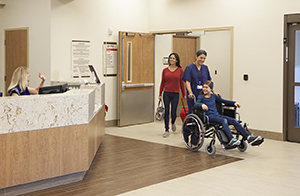You’re likely looking forward to when your child can return home from the hospital. Planning for your child’s discharge involves all the members of your child’s care team. They’ll work closely with you to prepare for your child’s needs at home. Below are some of the things to know about hospital discharge.
When can your child be discharged?
Most children can be discharged from the hospital when:
-
They have stable vital signs. This means that their heart and respiratory rates, blood pressure, and temperature are normal.
-
Their pain is under control and can be managed at home.
-
They can pee and have a bowel movement.
-
They can eat and drink, or otherwise take in enough nutrition.
Before your child’s discharge
Here is what to expect:
-
Hospital staff, such as a discharge planner or case manager, can advise you on various topics. They can help with insurance or hospital billing, refer you to helpful resources, and answer questions.
-
Nursing staff and other care team members go over any necessary information, such as instructions for medicines, with you. They'll show you how to do home care tasks and practice with you as needed. You’ll have the chance to ask any questions so that you fully understand these instructions.
-
Schedule a follow-up appointment with your child’s primary health care provider before you leave the hospital.
-
Make sure you have contact information for how to get supplies. This is if your child needs equipment, such as a feeding pump.
-
Check with a member of your child’s care team that prescriptions are filled. Have pain medicines ready before leaving.
-
Have a change of clothes ready for your child. Your child will change from a hospital gown into street clothes before leaving the hospital.
-
Check that you have all your child’s belongings with you.
-
Have a mode of transportation (such as a car or taxi) ready to take you and your child home. A car seat may be required by state law if you have an infant, toddler, or small child.
-
A wheelchair is used to take your child from the hospital room out to the car. This is to make sure your child leaves the hospital safely.
At home
Here are some tips for taking care of your child at home:
-
Care for your child as you’ve been instructed.
-
Call your child’s health care provider if you have questions about any discharge instructions.
-
Call your child’s provider if your child has any symptoms that suggest a return of illness or infection. You’ll likely be given a list of symptoms that should prompt you about when to call.
-
Call
911 if you have an urgent concern or think your child’s symptoms are life-threatening. -
A home health agency may visit to deliver, set up, or help you learn to use equipment you may need for your child’s care. This includes equipment such as a wheelchair, oxygen, feeding tubes, or traction.
Featured in


